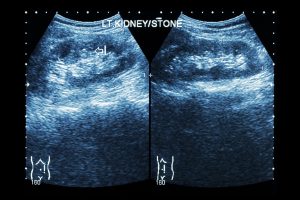 Recurrent kidney stone patients are at a higher risk of heart disease and osteoporosis. The findings suggest that close monitoring of recurring kidney stones could help protect patients from heart-related problems.
Recurrent kidney stone patients are at a higher risk of heart disease and osteoporosis. The findings suggest that close monitoring of recurring kidney stones could help protect patients from heart-related problems.
Nearly 10 percent of men and seven percent of women will develop kidney stones, and over the last few decades mounting evidence has shown that individuals who have experienced kidney stones have an increased risk of developing other conditions, including hypertension, chronic kidney disease, and heart disease, but the mechanisms involved were long unknown.
Advertisement
The researchers speculate that the rise of heart-related conditions due to recurring kidney stones may be associated with abnormal calcium deposits in the blood vessels. Vascular calcification is strongly correlated with heart-related disease and death.
The researchers used CT scans to evaluate severity of calcium deposits in the blood vessels on 111 participants of which 57 had recurring kidney stones and the remaining individuals were healthy.
The researchers found that people with recurring kidney stones had higher calcification in the abdominal aorta. Patients with recurring kidney stones were found to have lesser bone density, compared to the healthy participants.
Lead researcher Dr. Linda Shavit said, “Our findings raise several important questions that may be relevant to the care of patients with kidney stones. Existing CT can be a useful tool for assessment of aortic calcification and osteoporosis, along with kidney stone number and distribution. Moreover, preliminary experimental and clinical evidence suggests that therapeutic strategies aimed to treat osteoporosis may have a favorable effect on vascular calcification.
Dr. Eric Taylor wrote in an accompanying editorial, “The nexus between calcium kidney stone formation, bone demineralization, and atherosclerosis should be an active area of investigation pursued by the clinical investigator and basic scientist alike. Future studies will require careful assessment of calcium-phosphorus regulatory hormones and inhibitors of tissue calcification hypothesized to play important roles in the complex pathophysiology of all three disease states.”
Kidney stone recurrence can be predicted by new tool: Previous study
A new tool has been found to accurately predict kidney stone recurrence, which can help doctors and patients implement preventative measures. The tool utilizes 11 questions to asses kidney stone risk in the next two, five, or 10 years.
Some risk factors for recurring kidney stones include being younger in age, being a white male, as well as having a family history of kidney stones, blood in urine, uric acid kidney stones, an obstructing stone in the kidney pelvis, and a past history of kidney stone-related pain without the presence of a kidney stone.
The tool was developed by Dr. Andrew Rule of the Mayo Clinic from data taken from over 2,200 adults.
Rule said, “If we knew which patients were at high risk for another symptomatic kidney stone, then we could better advise patients on whether to follow stone prevention diets or take medications. At the same time, patients who are at low risk of having another kidney stone may not need restrictive diets and medications.”
Related Reading:
Kidney stones in women raise the risk of stroke and coronary heart disease (CHD)
Kidney stones in women raise the risk of stroke and coronary heart disease (CHD). Lead researcher Yanqiong Liu said, “People should be concerned about kidney stones. Evidence suggests an association between kidney stones and incident cardiovascular disease, even after adjusting for other cardiovascular risk factors.” Continue reading…
Advertisement
Kidney stone risk may be reduced with a DASH diet plan
Kidney stone risk may be reduced with a DASH diet plan. The DASH diet is commonly recommended to individuals looking to lower their blood pressure through dietary intervention. The DASH stands for Dietary Approaches to Stop Hypertension. Well, a study now suggests that the DASH diet may be more effective than a low-oxalate diet for reducing the risk of kidney stones. Continue reading…
Sources:
http://www.webmd.com/kidney-stones/news/20140807/will-kidney-stones-recur-new-test-might-tell
http://www.newswise.com/articles/blood-vessel-calcification-may-put-kidney-stone-formers-at-increased-risk-of-heart-disease
